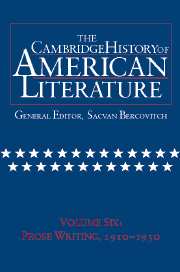Book contents
- Frontmatter
- Introduction
- A Cultural History of the Modern American Novel: Introduction
- 1 A Dream City, Lyric Years, and a Great War
- 2 Fiction in a Tme of Plenty
- 3 The Fate of Writing During the Great Depression
- Fictions of the Harlem Renaissance
- Ethnic Modernism
- Introduction
- 1 Gertrude Stein and “Negro Sunshine”
- 2 Ethnic Lives and “Lifelets”
- 3 Ethnic Themes, Modern Themes
- 4 Mary Antin: Progressive Optimism against The Odds
- 5 Who is “American”?
- 6 American Languages
- 7 “All the Past We Leave Behind”? Ole E. Rölvaag and the Immigrant Trilogy
- 8 Modernism, Ethnic Labeling, and The Quest for Wholeness: Jean Toomer’s New American Race
- 9 Freud, Marx, Hard-Boiled
- 10 Hemingway Spoken Here
- 11 Henry Roth: Ethnicity, Modernity, and Modernism
- 12 The Clock, The Salesman, and the Breast
- 13 Was Modernism Antitotalitarian?
- 14 Facing the Extreme
- 15 Grand Central Terminal
- Chronology
- Bibliography
- Index
8 - Modernism, Ethnic Labeling, and The Quest for Wholeness: Jean Toomer’s New American Race
from Ethnic Modernism
Published online by Cambridge University Press: 28 March 2008
- Frontmatter
- Introduction
- A Cultural History of the Modern American Novel: Introduction
- 1 A Dream City, Lyric Years, and a Great War
- 2 Fiction in a Tme of Plenty
- 3 The Fate of Writing During the Great Depression
- Fictions of the Harlem Renaissance
- Ethnic Modernism
- Introduction
- 1 Gertrude Stein and “Negro Sunshine”
- 2 Ethnic Lives and “Lifelets”
- 3 Ethnic Themes, Modern Themes
- 4 Mary Antin: Progressive Optimism against The Odds
- 5 Who is “American”?
- 6 American Languages
- 7 “All the Past We Leave Behind”? Ole E. Rölvaag and the Immigrant Trilogy
- 8 Modernism, Ethnic Labeling, and The Quest for Wholeness: Jean Toomer’s New American Race
- 9 Freud, Marx, Hard-Boiled
- 10 Hemingway Spoken Here
- 11 Henry Roth: Ethnicity, Modernity, and Modernism
- 12 The Clock, The Salesman, and the Breast
- 13 Was Modernism Antitotalitarian?
- 14 Facing the Extreme
- 15 Grand Central Terminal
- Chronology
- Bibliography
- Index
Summary
“Seventh Street,” set in post-World War I Washington, DC, opens and closes with the same short poem:
Money burns the pocket, pocket hurts,
Bootleggers in silken shirts,
Ballooned, zooming Cadillacs,
Whizzing, whizzing down the street-car tracks.
The page that is framed by this poem of urban modernity is both lyrical invocation and apostrophe of the black migrants who form a “wedge” of jazz songs and life driven into “the white and whitewashed wood of Washington.” “Seventh Street” is part modernist prose poem that expresses the rhythms and noise of the city of Prohibition, and part meditation on the meaning of migration. At its center is the repeated question, “Who set you flowing? Flowing down the smooth asphalt of Seventh Street, in shanties, brick office buildings, theaters, drug stores, restaurants, and cabarets?”
“Seventh Street” opens the second part of Jean Toomer’s Cane (1923), and experimental book that marks the full arrival and a high point of achievement of American ethnic modernism. Published by the prestigious house of Boni and Liveright in 1923, still before Ernest Hemingway’s and William Faulkner’s first important books were to appear, Cane was a powerful contribution to the specific stream of modernism that included Stein’s Three Lives, James Joyce’s Dubliners, and Sherwood Anderson’s Winesburg, Ohio, though Toomer also was inspired by modern poetry (Hart Crane’s poem The Bridge), Eugene O’Neill’s plays, Waldo Frank’s manifesto Our America, Georgia O’Keeffe’s paintings, and Alfred Stieglitz’s photographs. An avid reader, Toomer was drawn to Shaw, Ibsen, Dostoyevsky, Tolstoy, Baudelaire, Flaubert, and Melville.
- Type
- Chapter
- Information
- The Cambridge History of American Literature , pp. 442 - 451Publisher: Cambridge University PressPrint publication year: 2002



